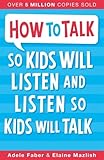How to talk so kids will listen and listen so kids will talk / Adele Faber & Elaine Mazlish ; illustrations by Kimberly Ann Coe.
Publication details: London : Piccadilly Press, 2013Edition: 30th anniversary edDescription: xiv, 345 pages : illustrations ; 20 cmISBN: 9781848123090 (paperback)Subject(s): Parenting | Interpersonal communication | Parent and child | Communication in families | Social skills | Parenting | EmotionsSummary: Faber and Mazlish use real-life situations to show how you can respect and respond to your child's feelings and satisfy your own needs. Summary: In this international bestseller, experts Adele Faber and Elaine Mazlish provide effective step by step techniques to help you improve and enrich your relationships with your children. Learn how to: Break a pattern of arguments; Cope with negative feelings; Engage your child's cooperation; Set clear limits and maintain goodwill; Express your emotions without being hurtful; Resolve conflicts peacefully. The opening paragraph sets the tone for the rest of the book: "I was a wonderful parent before I had children. I was an expert on why everyone else was having problems with theirs. Then I had three of my own." The authors recognise that a common reaction by parents to their children is, without being conscious of it, denial of their children's feelings, which can then teach children not to trust their own feelings. They give several examples in a similar vein. "Child: Mommy, I'm tired. Me: You couldn't be tired. You just napped. Child: (louder) But I'm tired. Me: You're not tired. You're just a little sleepy. Let's get dressed. Child: (wailing) No, I'm tired!" They should how counter-productive denial of feelings can be by asking the adult to imagine a negative work-place scenario and a number of different responses offered by a friend, who is well-intentioned but essentially manages to irritate or offend. This is a helpful exercise to make parents and caregivers aware of their own behaviour. Each chapter gives themed examples and recommendations on how to approach them, with real-life examples from the authors' personal experience and the experiences of parents, caregivers, and children who have attended their workshops. There are brief worksheet activities to get the parent engaged on the issue (e.g. jot down other possibilities, apart from punishment, for handling a child misbehaving in a supermarket;), and there are short summary cartoon illustrations as a visual memory aid for the reader. Each chapter concludes with an assignment for the parent/caregiver to put what they have learned into practice, for example, noting down their response to "This coming week, use an alternative to punishment. What alternative did you use? What was your child's reaction?" This anniversary edition (the original was published in 1980) includes letters submitted from readers (not all of which are positive), an account of what it is was like to be the daughter of one of the authors, plus some recommended reading. Audience: Adult; Adult caregiver; Professional| Item type | Current library | Collection | Call number | Status | Date due | Barcode | |
|---|---|---|---|---|---|---|---|
 Book
Book
|
Mercy University Hospital Psycho-oncology | Adult | PC07 (Browse shelf(Opens below)) | Available | 39117000000155 |
Includes index.
Includes bibliographical references (333-334) and index (337-345).
Faber and Mazlish use real-life situations to show how you can respect and respond to your child's feelings and satisfy your own needs.
In this international bestseller, experts Adele Faber and Elaine Mazlish provide effective step by step techniques to help you improve and enrich your relationships with your children. Learn how to: Break a pattern of arguments; Cope with negative feelings; Engage your child's cooperation; Set clear limits and maintain goodwill; Express your emotions without being hurtful; Resolve conflicts peacefully. The opening paragraph sets the tone for the rest of the book: "I was a wonderful parent before I had children. I was an expert on why everyone else was having problems with theirs. Then I had three of my own." The authors recognise that a common reaction by parents to their children is, without being conscious of it, denial of their children's feelings, which can then teach children not to trust their own feelings. They give several examples in a similar vein. "Child: Mommy, I'm tired. Me: You couldn't be tired. You just napped. Child: (louder) But I'm tired. Me: You're not tired. You're just a little sleepy. Let's get dressed. Child: (wailing) No, I'm tired!" They should how counter-productive denial of feelings can be by asking the adult to imagine a negative work-place scenario and a number of different responses offered by a friend, who is well-intentioned but essentially manages to irritate or offend. This is a helpful exercise to make parents and caregivers aware of their own behaviour. Each chapter gives themed examples and recommendations on how to approach them, with real-life examples from the authors' personal experience and the experiences of parents, caregivers, and children who have attended their workshops. There are brief worksheet activities to get the parent engaged on the issue (e.g. jot down other possibilities, apart from punishment, for handling a child misbehaving in a supermarket;), and there are short summary cartoon illustrations as a visual memory aid for the reader. Each chapter concludes with an assignment for the parent/caregiver to put what they have learned into practice, for example, noting down their response to "This coming week, use an alternative to punishment. What alternative did you use? What was your child's reaction?" This anniversary edition (the original was published in 1980) includes letters submitted from readers (not all of which are positive), an account of what it is was like to be the daughter of one of the authors, plus some recommended reading.
Audience: Adult; Adult caregiver; Professional
There are no comments on this title.
